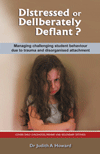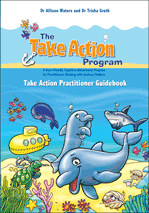Overcoming School Refusal: A practical guide for teachers, counsellors, caseworkers and parents
Joanne Garfi
Psychologist Joanne Garfi spends most of her working life assisting parents, teachers, school counsellors, caseworkers, and community policing officers on how best to deal with school refusal. Now her experiences and expertise are available in this easy-to-read practical book.
Overcoming School Refusal helps readers understand this complex issue by explaining exactly what school refusal is and provides them with a range of strategies they can use to assist children in returning to school. Areas covered include:
• types of school refusers
• why children refuse to go to school
• symptoms
• short term and
• accurate assessment
• treatment options
• what parents can do
• what schools can do
• dealing with anxious high achievers
• how to help children on the autism spectrum with school refusal
WORKSHOPS NOW AVAILABLE
Presenter: Joanne Garfi
VIC
Contact ADAVIC on 9853 8089 or email adavic@adavic.org.au
All other states
Contact Compass Seminars www.compassaustralia.com
You may also like:
About the Author
Joanne Garfi is a psychologist with over 30 years of experience and expertise in child and adolescent issues, including as a school psychologist, working in both primary and secondary schools providing specialised training to teachers. She has a special interest in the treatment of anxiety and panic disorder and is well known for her work with childhood anxiety, behavioural disorders and developmental issues. She currently conducts workshops on school refusal around Australia. Joanne uses Cognitive Behavioural Therapy (CBT), mindfulness and skills development and prefers to take a whole person approach to treatment. Her emphasis when working with children is to have families and schools working together to bring about change.Reviews
"Children need to believe they are capable and should expect that ‘in each lesson they will pick up where they left off and that progress will take place.”
Joanne Garfi is an Australian psychologist and author with over thirty years of experience and expertise in child and adolescent issues, including as a school psychologist, working in both primary and secondary schools providing specialised training to teachers. She is particularly interested in the treatment of anxiety and panic disorder and is well known for her work with childhood anxiety, behavioural disorders and developmental issues. She currently conducts workshops on school refusal around Australia. Joanne uses Cognitive Behavioural Therapy (CBT), mindfulness and skills development and prefers to take a whole person approach to treatment. Her emphasis when working with children is to have families and schools working together to bring about change.
Garfi’s book, Overcoming School Refusal, offers useful information to professionals as well as to teachers and parents and many of her practical strategies will be of value not only to musicians who are teachers, but also to Loudmouth’s readers in general. For example, there may be reasons why a child decides to discontinue music lessons and, as Garfi insists, early investigation is vital. The teacher needs to work with the parents, and sometimes with a professional, to establish the cause, to validate the child’s feelings and to follow up with some of the plans suggested by Garfi.
Garfi writes that ‘school refusal’ is not to be confused with ‘truancy’; she views school refusal as an anxiety disorder, where anxiety and distress become associated with going to school and may become entrenched.
The first three chapters in the book describe what school refusal is, why it happens and what are its impacts—they also include a number of case studies. Garfi describes the physical symptoms, emotional and social consequences and their effects upon the child and the family, thus providing a useful checklist for both parents and teachers. Garfi emphasises the need for early intervention, so these checklists are invaluable.
The following chapters explain what both professionals and parents can do: ‘parent support is essential if we are to be successful in returning a student to full-time schooling. (…) They are the ones who emotionally and physically prepare the student for school’. Music teachers would surely reiterate these words.
Garfi’s advice to parents is clear and practical and emphasises the importance of listening and validating the child’s fears and feelings; she also suggests the usefulness of a ‘rewards and consequences’ strategy. Children need to believe they are capable and should expect that ‘in each lesson they will pick up where they left off and that progress will take place’.
Detailed plans for teachers follow and Garfi applies neuropsychology, offering relaxation strategies, mindfulness, boundary setting, exposure, and cognitive restructuring techniques. In the final paragraph of this chapter she comments on the role of medication in the treatment. Some of the plans for teachers could certainly be applied in the music teaching studio and the general reader may respond to some suggestions such as effective breathing exercises, relaxation exercises, progressive muscle relaxation and more. There is also an excellent general description of applied Cognitive Behavioural Therapy (CBT).
A large part of this book gives strategies for dealing with school refusal—it is informative and clearly written, practical and evidence-based, and offers a life-line to professionals as well as to teachers and parents dealing with anxiety disorders of all kinds.
Amazon:
Table of Contents
- Chapter 1 What is school refusal?
- Chapter 2 Why do children refuse to go to school?
- Chapter 3 The impacts of school refusal
- Chapter 4 What professionals can do
- Chapter 5 What parents can do
- Chapter 6 Treatment for school refusal
- Chapter 7 Treating high achievers who are school refusing
- Chapter 8 Treating students with autism spectrum disorder who are school refusing
- Resources
- Endnotes








